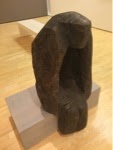Samoća - solitude; loneliness
Samostan - monastery
Samovoljan - self willed; obstinate
In a Split art gallery yesterday there was an incredibly evocative wooden sculpture called 'Sam IV' (1972) by Branko Ružić. It was in dark old wood, a trunk hollowed out to resemble a seated figure, hunched against the world. His back, shoulders, and head are rounded, hands seemingly tucked under his thighs. The effect of Ružić's simple, empathic carving is on the surface utterly bleak. If a friend or loved one was to sit like this, you'd think their world had fallen in.
The Croatian title 'Sam' was translated as 'Lonely' by the gallery, and presumably this would have been agreed with the artist. In my limited dictionary 'sam' seems less psychological than our word 'lonely'. Given the number of recent linguistic coincidences, it helped solidify some ideas and form these few words.
When I knew I was going on holiday alone, my heart sank. Previous solo holiday experiences, have been soul damaging and I was dreading the excruciating loneliness that a sole person can feel. However being an optimist, and knowing all holidays are not the same, I reasoned that a rented house is a different experience from a hotel.
Hotels mean couples, families, groups -all necessary cliques that are lovely when you are included, but as a single person, are virtually impossible to join. Indeed, why would a couple welcome a third, why would a family take in another? I would be reticent in their position. So hotels or resorts are lonely places when you are on your own for any length of time A little house or private apartment is another matter.
In my case it worked out perfectly because my neighbours - young, old, local, on holiday, etc, are very friendly. Happy dogs, the best ice cream, the changeable weather are all open to discussion. People on the street are happy to talk; couples in restaurants have struck up conversations; waiters are interested in why you're writing; other travellers in the ferry queues are thoroughly engaging.
In fact, as I noted to another solo female traveller, my problem has been finding peace and uninterrupted quiet! How churlish and ungrateful is that? We spent a little time together this morning as she was fresh off the Korčula ferry and wanted to know how to get to the 'samostan' on the hillside. Her efficient German guidebook said there were rooms to rent up there. Given I was happy to take a stroll on a fresh sunny morning, we had a pleasant meander, and I felt proud to show off my 'home'. Her book was so efficient, the rooms weren't yet built, so she asked the owner for a recommendation and we descended into town.
Having exhausted my tolerance of other humans, I did essential domestic things whilst mulling over the art from yesterday and those wonderful linguistic connections of sam. Or as I might translate, mislila sam o kiparstvu...I was thinking about sculpture. There is that sam again, essential in forming the past, as well as the singular present tense of to be; I am. The idea of a monastery being a living space to be alone is actually has quite a Woolfian ring to it. We all need a room in which to be alone, no matter how friendly and sociable we can be.
So I've certainly not been alone in the negative sense; nor even lonely, but have merely embraced the solitude. I initially learned the Croatian word in a translation of Gabriel Garcia Marquez's 'Cien años de soledad', which becomes 'Sto godina samoće'. I saw a copy in the local post office and was only in there because I was enjoying wanted the old fashioned seaside holidays of years past. Even a fortuitous incident was able to feed into and fuel my linguistic conundrum.
Although Rušić's piece is inherently sad, it rouses in the viewer a high state of emotion. We are helpless to repress a burst of human compassion for those alone, with no one either reaching out - or to reach out to. The conversations I've had have been ignited not through desperation or loneliness, but simple human pleasure in communication with others. But the material also cries volumes.
Wood is a comparatively soft and yielding organic matter. It is also able to undergo vast changes within, breathing, expanding, shrinking under environmental influence. So although this character is currently undergoing a difficult time, the wood suggests that given time and thought everything can change, and that offers optimism and hope to improve and accept circumstances.

No comments:
Post a Comment